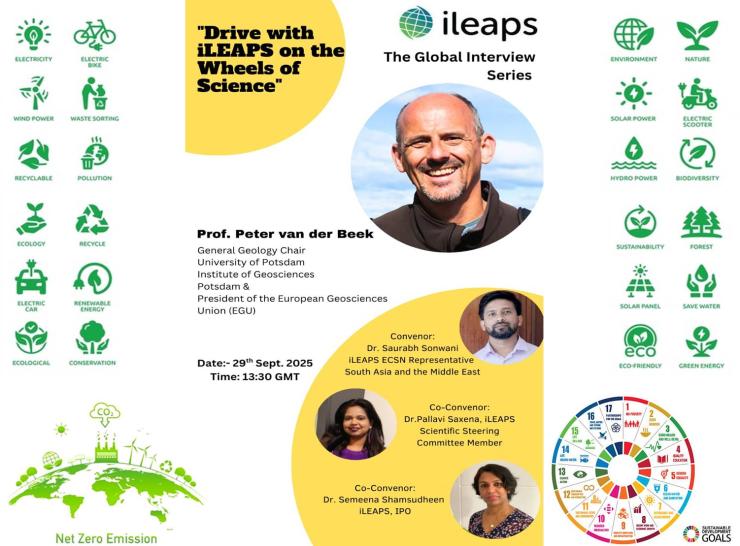
September 2025 - Prof. Peter van der Beek
Dr. Peter van der Beek is a professor of General Geology at the University of Potsdam in Germany and President of the European Geosciences Union (EGU). Prof. Beek’s research focuses on long-term landscape evolution and the controls on erosion rates and relief development over geological timescales. He uses quantitative methods such as thermochronology and cosmogenic nuclides to resolve erosion histories and combine these results with numerical models to examine potential controls on erosion and relief development.
He was elected as president at the EGU General Assembly in Vienna in April 2024. Through EGU platform, Prof. Beek aims to maintain and strengthen the forward-looking perspective of the EGU in issues such as Equality, Diversity and Inclusion, Open Science, sustainable meetings, as well as further strengthen the outreach of EGU toward policy makers, educators and the general public.
He was elected as president at the EGU General Assembly in Vienna in April 2024. Through EGU platform, Prof. Beek aims to maintain and strengthen the forward-looking perspective of the EGU in issues such as Equality, Diversity and Inclusion, Open Science, sustainable meetings, as well as further strengthen the outreach of EGU toward policy makers, educators and the general public.
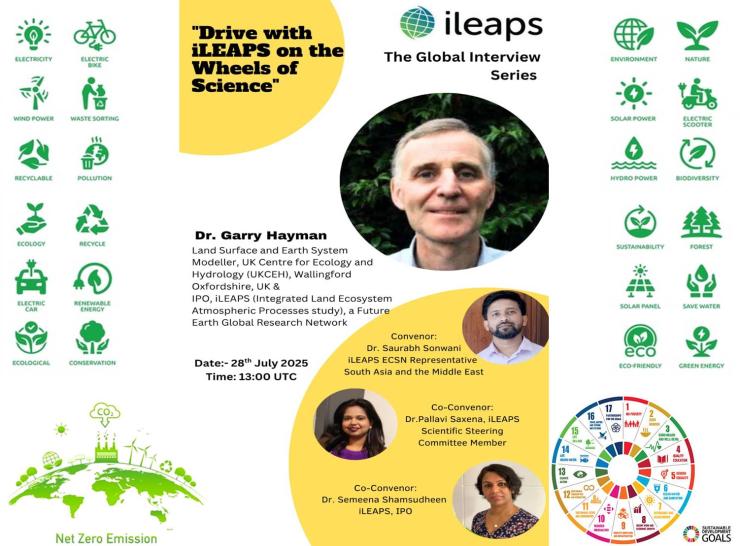
July 2025 - Dr. Garry Hayman
Garry has a D. Phil. in Chemistry from the University of Oxford for his work on the infrared spectroscopy of weakly-bound molecular clusters.
Garry’s current research interests cover land-atmosphere interactions (particularly biogeochemical), land surface and Earth system modelling and the use of measurements, including Earth Observation and remote sensing data, for model evaluation. Garry is the UKCEH lead of collaborative projects on the development and application of UK Earth System models. He is also the UKCEH lead for a project on peatlands (MotherShip). He was previously involved in research projects to assess and develop the methane wetland emission parameterisation in the JULES land surface model (https://jules.jchmr.org/).
Garry’s current research interests cover land-atmosphere interactions (particularly biogeochemical), land surface and Earth system modelling and the use of measurements, including Earth Observation and remote sensing data, for model evaluation. Garry is the UKCEH lead of collaborative projects on the development and application of UK Earth System models. He is also the UKCEH lead for a project on peatlands (MotherShip). He was previously involved in research projects to assess and develop the methane wetland emission parameterisation in the JULES land surface model (https://jules.jchmr.org/).
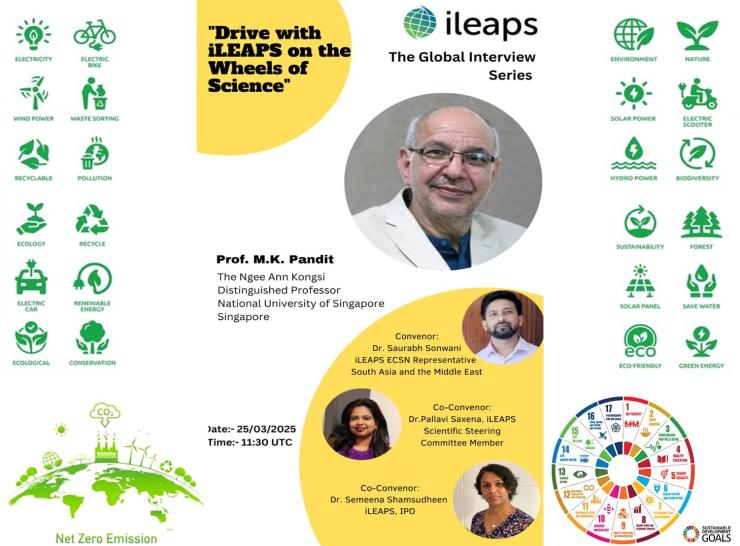
March 2025 - Prof. M K Pandit
Professor Maharaj Krishan Pandit is a scholar in the field of Himalayan ecology, environmental
conservation, and sustainability. He is currently the Ngee Ann Kongsi Distinguished Professor at
the National University of Singapore. He is the former Dean, Jindal School of Environment and
Sustainability and held various leadership roles at the University of Delhi, including Founding CEO of the Institution of Eminence, Dean Research Council, Dean, Faculty of Science, Head, Department of Environmental Studies.
conservation, and sustainability. He is currently the Ngee Ann Kongsi Distinguished Professor at
the National University of Singapore. He is the former Dean, Jindal School of Environment and
Sustainability and held various leadership roles at the University of Delhi, including Founding CEO of the Institution of Eminence, Dean Research Council, Dean, Faculty of Science, Head, Department of Environmental Studies.
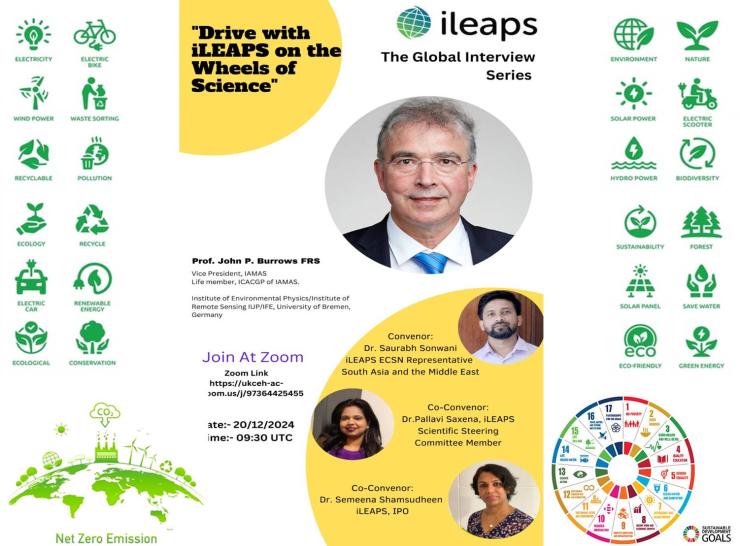
December 2024 - Prof. John Burrows
Prof. Burrows is a Professor at the University of Bremen in 1992 where he has worked since. His research has contributed to our scientific understanding of air pollution, the ozone layer, the upper atmosphere, biogeochemistry and climate change. Burrows is a fellow of the American Association for the Advancement of Science (AAAS), American Geophysical Union (AGU), the International Union of Geodesy and Geophysics (IUGG), the Centre for Ecology and Hydrology and member of IAA. His research accolades include being awarded the following: the Committee on Space Research (COSPAR) William Nordberg Medal in 2006, the NASA Group Achievement Award in 2008, the Journal of Quantitative Spectroscopy & Radiative Transfer (JQSRT) Milestone Paper Award in 2010, Haagen-Smit Prize 2012, EGU Vilhelm Bjerknes Medal 2013, IUGG Silver Medal IUGG 2015, and the Alfred Wegener Medal EGU 2016.[3] Burrows was elected a Fellow of the Royal Society (FRS) in 2016.
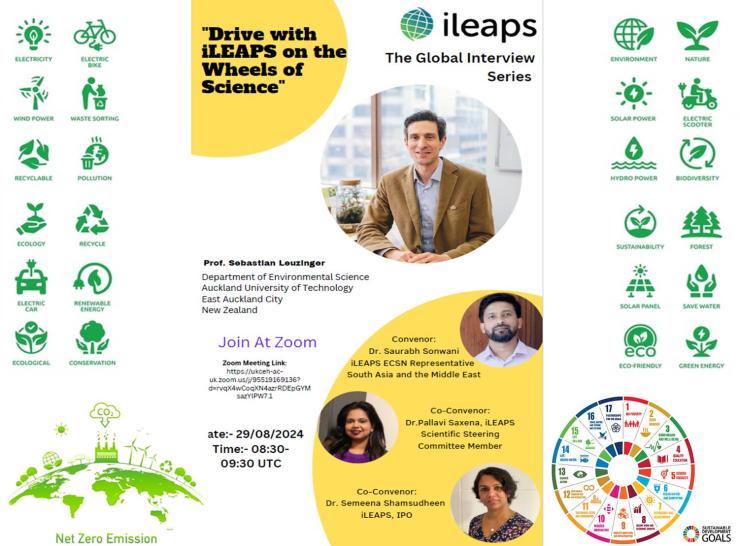
August, 2024 - Prof. Sebastian Leuzinger
Prof. Leuzinger is a broadly interested plant ecologist working at the interface of experimental and modelling work. Coming from an ecophysiological background (plant - atmosphere relations), he is increasingly interested in meta-analyses and overarching trends in the response of plants to global change drivers. More specifically, he is researching how an increase in atmospheric CO2 can cause plant communities to change through the less known indirect effects operating via soil moisture savings. He is involved in a number of international efforts to synthesise global results from elevated CO2 experiments. On a smaller scale, he is interested in how plants transport water and how this relates to carbon exchange and storage. Mangroves provide a great model ecosystems for this purpose, as they are mature forests, yet accessible and located in very homogenous conditions.
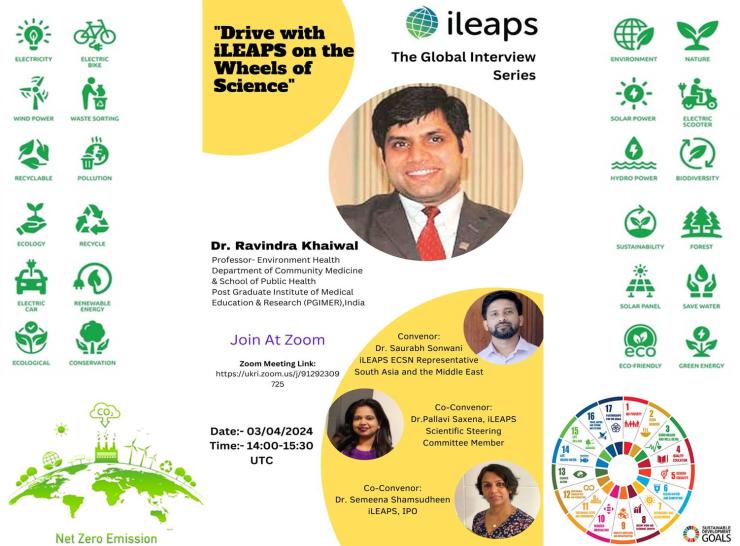
March 2024 - Dr. Ravindra Khaiwal
Dr. Ravindra Khaiwal, a distinguished figure in the field of Environmental Health and Public Health. Dr. Khaiwal is currently holding the esteemed position of ‘Professor of Environmental Health’ at the Department of Community Medicine and School of Public Health (DCM&SPH), PGIMER, Chandigarh. With an illustrious career spanning both academia and research, he has made significant contributions to the understanding of environmental health risks, air pollution, and climate change adaptation strategies.
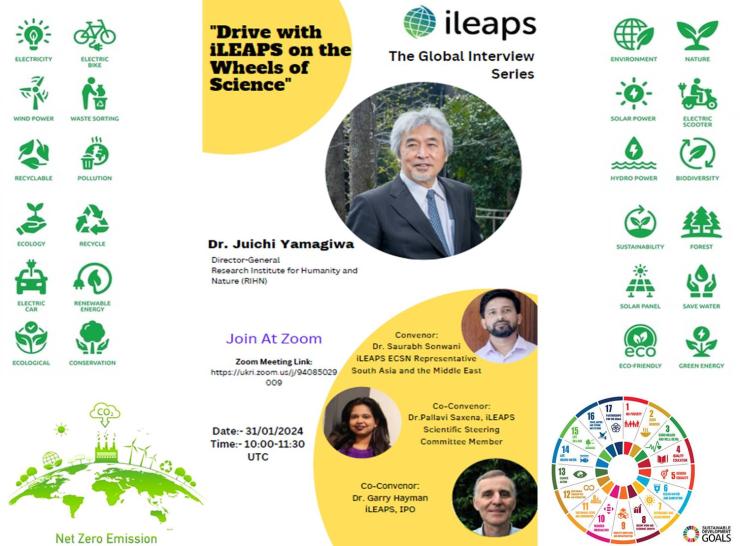
January 2024 - Dr. Juichi Yamagiwa
Dr. Yamagiwa graduated from the Faculty of Science at Kyoto University, followed by a doctoral program at the Graduate School of Science in the same university. After working as a visiting researcher at the Karisoke Research Center in the Republic of Rwanda. He also worked as a researcher at the Japan Monkey Center, an assistant at the Primate Research Institute at Kyoto University, an assistant professor and professor at the Graduate School of Science at Kyoto University. He then became the Dean of the Graduate School of Science and the Dean of the Faculty of Science, and was the 26th President of Kyoto University. He is now the director of the Research Institute for Humanity and Nature. He specialises in Human Evolution and engaged in socio-ecological research on wild Japanese macaques in Yakushima and wild gorillas throughout Africa.
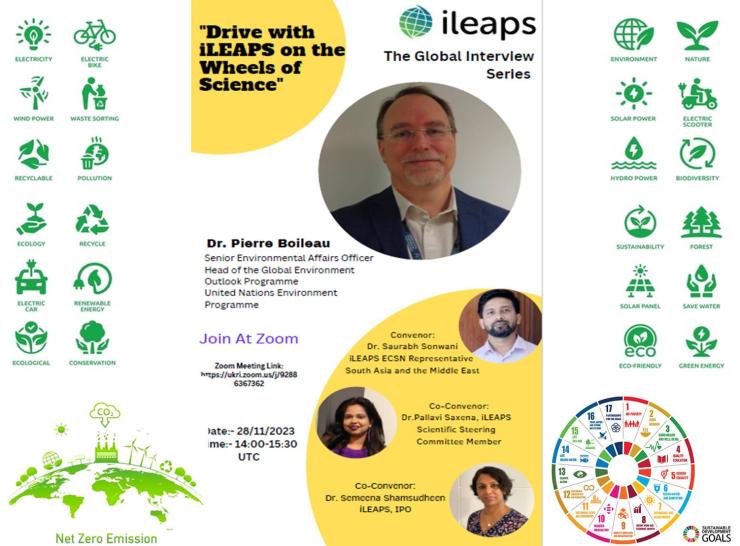
November 2023 - Dr. Pierre Boileau
Dr. Boileau is currently the Head of the Global Environment Outlook programme at the UN Environment Programme. In this role he is leading his team and over 200 experts to complete the seventh edition of the Global Environment Outlook, or GEO-7. This more solutions-focused assessment, will build off of the findings of the sixth Global Environment Outlook, published in March, 2019, as well as 6 regional environmental assessments, published in May, 2016, which Pierre also led. Pierre’s team is also increasing its work with GEO collaborating centres and providing supporting services to Member States and other stakeholders in the areas of capacity building, knowledge generation and support for policy making.
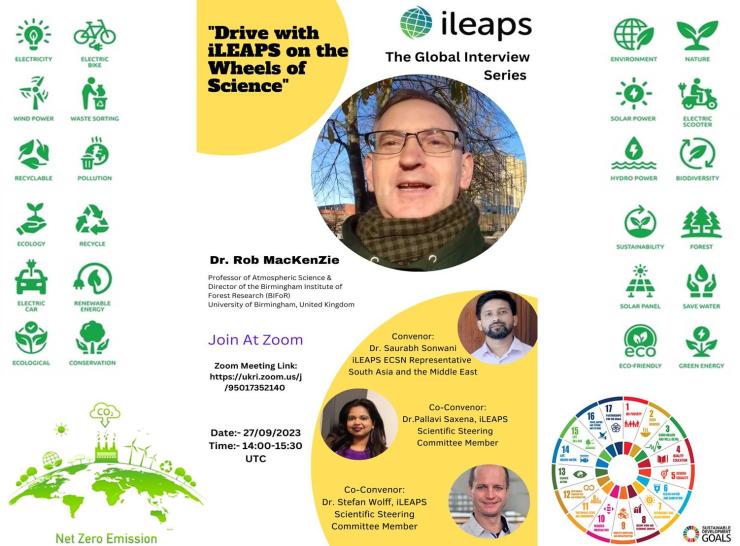
September, 2023 - Prof. Rob MacKenzie
Rob MacKenzie is an atmospheric scientist with a particular interest in how plants affect air composition. He is the inaugural Director of Birmingham Institute of Forest Research (BIFoR). BIFoR will focus on two linked challenges: the impact of climate and environmental change on woodlands; and the resilience of trees to pests and diseases. Rob is developing a broader understanding of urban systems and their resilience, particularly urban green infrastructure, as discussed in an informal essay featured on the Institute of Advanced Studies' Saving Humans website.
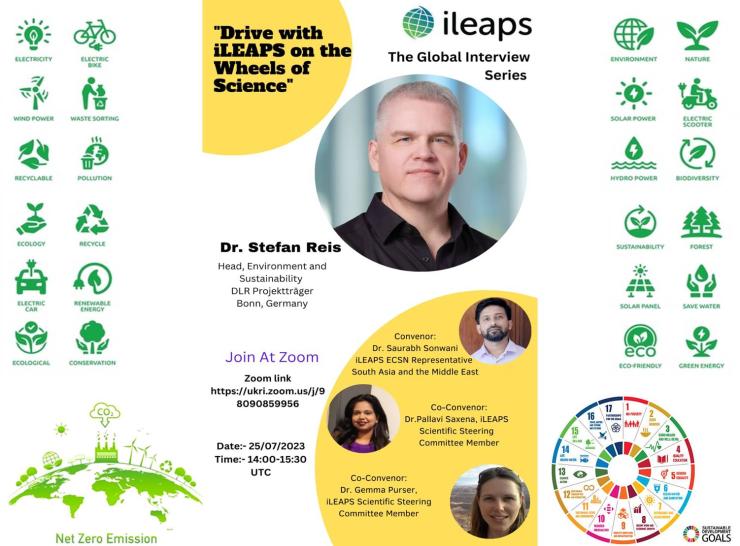
July, 2023 - Prof. Stefan Reis
Professor Stefan Resis has a background in modelling air pollution and climate change, and their effects on human and ecosystem health, with 26 years of research experience at the interface between environment and health, with research topics including integrated assessment modelling, integrated environmental assessments, and environmental modelling. Stefan holds fellowships with the UK Centre for Ecology & Hydrology (UKCEH), the Modelling and Simulation Society of Australia and New Zealand (MSSANZ) and the international Environmental Modelling and Software society (iEMSs). He is president of iEMSs and a visiting professor at the University of Edinburgh School of Chemistry. His main role is head-of-unit for environment and sustainability at the German Aerospace Centre's Project Management Agency (DLR PT).
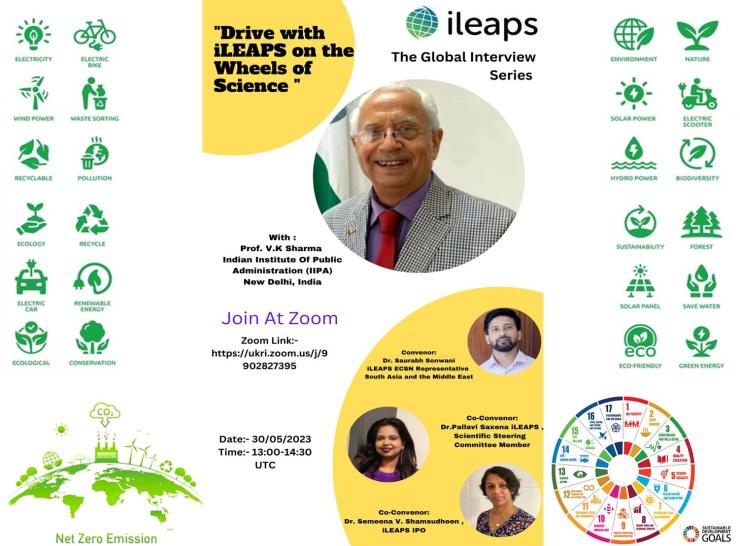
May 2023 - Prof. V. K. Sharma
He is the founder coordinator of National Center for Disaster Management. Currently he is serving as Senior Professor at Indian Institute of Public Administration. He also served as associate professor at University of Benghazi, University of Sulaymaniyah and Salahaddin University-Erbil, Consultant at University of Delaware and visiting professor at Kyoto University. He is resource person at Lal Bahadur Shastri National Academy of Administration. He is the first professor of disaster management in India and got Subhash Chandra Bose Aapda Prabandhan Puraskar in 2022. He is known for efforts for bringing disaster risk reduction in India.